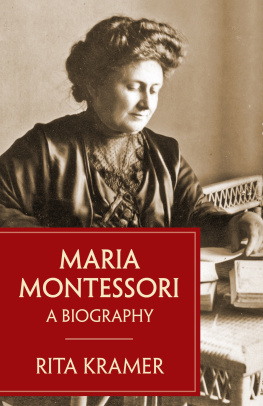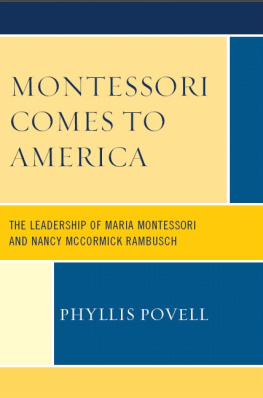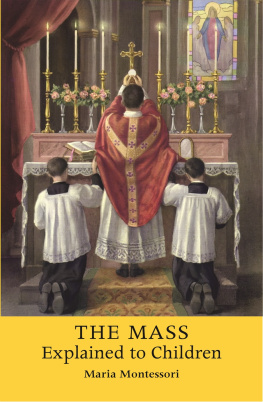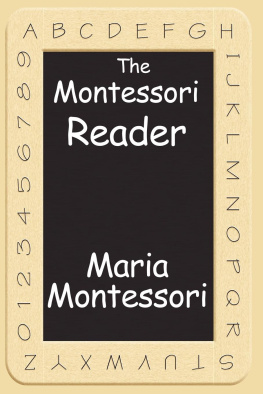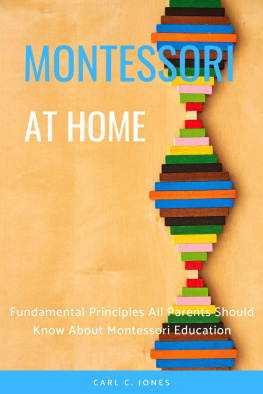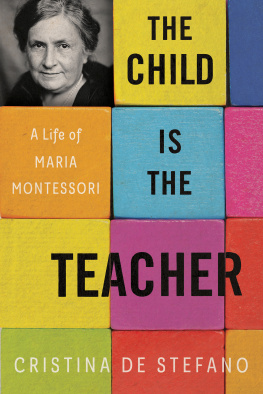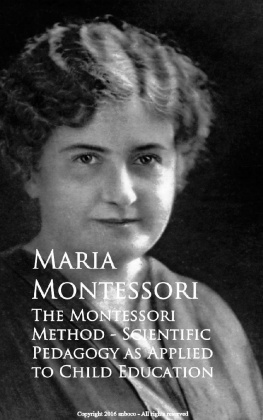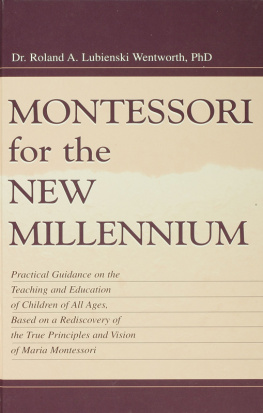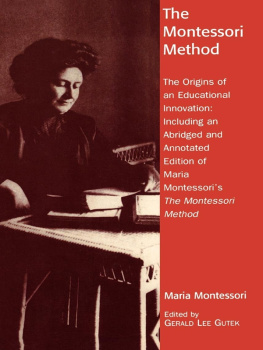Maria Montessori
A Biography
Rita Kramer
Copyright
Diversion Books
A Division of Diversion Publishing Corp.
443 Park Avenue South, Suite 1008
New York, NY 10016
www.DiversionBooks.com
Copyright 1988, 1976 by Rita Kramer
All rights reserved, including the right to reproduce this book or portions thereof in any form whatsoever.
Photographs dated 1913, 1919, 1949, circa 1950, and circa 1951 are reproduced with the permission of the American Montessori Society.
For more information, email
First Diversion Books edition May 2017
ISBN: 978-1-63576-109-2
For W.A.S.
Foreword by Anna Freud
Maria Montessoris personality and the value of her contributions justify the thorough, scrupulous description that is allotted to them in this book. Those who were aware only of the later effects of her work will now see her endeavours arranged in the historical context to which they owe their origin, and can follow the bitter struggle for social progress of which only a strong will like hers could be capable. Guided by the author in an enthralling manner, the reader will see develop before him the picture of Maria Montessori, who in 1896 was the first woman to become a physician in Italy. She was fascinated by the goal of improving the lot of poor, subnormal children who were disadvantaged both by physical constitution and circumstances. What followed, and is here made completely comprehensible for the first time, is her turning away from medicine to pedagogy, and the broadening of her circle of influence beyond her native Italy to all the countries of the worldan inevitable step of momentous importance for entire generations of normal children.
As a contemporary of Maria Montessori and her co-workers, I can attest from my own experience to the grateful enthusiasm which is described in this book, the enthusiasm with which her teachings were received and applied in many places and under many titles. Social workers, kindergarten teachers, child psychologists, and child psychoanalysts agreed in the conviction that the Montessori method in important aspects surpassed everything that had been offered to the educator up to then. In a Montessori Childrens House (like the one in Vienna) the child was master in his own house. For the first time his interest in the material on hand could develop freely, instead of being arranged as in the usual kindergarten in a prescribed group activity. For the first time not the praise and disapproval of adults, but joy in the success of ones own work came into its own as a suitable impetus. Above all, not authoritarian discipline, but freedom within carefully placed limits was the principle of education.
Today, twenty-five years after Maria Montessoris death, her teachings share the fate of other innovations that were pioneering in their time; they are not always applied in the pure form sanctioned by their originators, but have had to submit to amplifications and changes. Furthermore, only a few of those who are active today along the lines of Maria Montessori share her own religious and sense-perception/psychological background. That, however, does not alter the fact that the most important elements of the Montessori method have entered into modern pedagogy in one form or another and have become indispensable components of the education of small children, components that cannot be ignored.
Preface
This book is an attempt to look at Maria Montessoris life and work in order to see who she was, where she came from, and what happened to her: to identify the intellectual influences on her thought and suggest the role of her personality in her work, not in order to diminish but to explain itto show in just what her originality consisted. All ideas build on other ideas. The interesting thing is not that mere fact but which ones they were and how they were made use of and changed, combined and refined into something new.
Maria Montessori is much more complicated and interesting than the plaster saint her devoted followers have made her into. Under all the quasi-mystical reverence, the hagiography that has passed for biography, is a tough, intelligent woman who, at least in her youth, thought and did things no one had ever done before.
It is the search for that woman which motivated this attempt to go beyond a narrow cultist view of her self and her achievements, to introduce Maria Montessori to those to whom she remains unknown or misunderstood.
It is a search that led across several continents, into forgotten archives and into the memories of men and women whose lives she touched and often changed. What it revealed was a new womanboth in the sense in which Montessori herself used the term and in the biographers sense.
Biographies of famous men and women go through stages which seem to obey a set of laws applying to all ideas. Every generation consists of revisionists. Early attempts to gather facts and interpret them are inevitably superseded by views based on new discoveries, new outlooks.
If this history of Montessoris life and work serves to stimulate further research into her achievements and new ways of looking at them, it will have accomplished its purposeto reintroduce her to new generations as a teacher from whom they have learned much of what they know and from whom they may still learnabout children, about her, about themselves.
Acknowledgments
The success of a work like this, for which the sources are in large part materials which have not been previously collected or published, depends greatly on the cooperation of others. Foremost among those who helped make it possible for me to learn what I had to know in order to write this account of Maria Montessoris life and work were her son, Mario Montessori, and his wife, Ada Montessori-Pierson, whose generosity in providing documents and sharing their memories was equaled only by the freedom they allowed me to use what they made available in my own way, interpreting it according to my own point of view as it evolved in the course of research and writing. During the years that I worked on this book they repeatedly made time to talk with me at their home in Holland, where they received me with cordial hospitality and never made me feel that my questions were impertinent. Mario Montessori talked with me freely about the many years he spent assisting his mother in her work and her travels as well as about his own early childhood experiences and what he had been told about his mothers early life. Without his confidences it would have been impossible to see the story of her life in any wholeness.
Dr. Mario M. Montessori, Jr., Maria Montessoris grandson, shared with me his memories of his grandmother and his own view of her work as a psychoanalyst interested in child development.
Between visits, Mario and Ada Montessori answered numerous letters full of queries with detailed information gathered from letters and documents in their personal possession and in the offices of the Association Montessori Internationale in Amsterdam. I am particularly indebted to them for preparing from documents in their possession a detailed chronology of events in the lives of Maria Montessoris parents and of her early school years and for making available to me the contents of a book of press clippings put together by Alessandro Montessori in the first year of this century, a unique record of the public events in Maria Montessoris life in the years from 1892 to 1900. In addition, they gave me free access to the clippings and other materials in the AMI offices in Amsterdam, where I was helped in countless ways by its executive secretary Nicolette VanderHeide-Verschuur.
The contributions of the Montessori family extended to making no conditions as to my use of the material they provided. Much of the credit for the depth and breadth of the story told in the early pages of this book belongs to them; any limitations it has are my own. Although I had the unflagging cooperation of the Montessori family in the research on which this book is based, it is in no sense an authorized biography.

